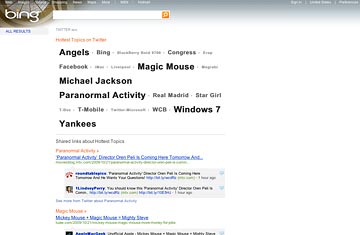
Updated: Oct. 22, 2009
Microsoft revealed a nice little coup in its dual quests to make search more dynamic and crawl its way into Google's monolithic grill. At the Web 2.0 conference in San Francisco, the company's digital head, Qi Lu, announced that three-month-old Bing had reached an agreement to crawl all of Twitter's public results in real time. Bing's Twitter search — Bing.com/Twitter — is already live.
For Microsoft, latching onto Twitter's rise is more than just a big marketing win; it's also a technological victory. Twitter is a huge, previously untapped resource in the movement toward search that relies on real-time data rather than archived links. (There was also a strong industry rumor that a similar deal between Bing and Facebook had been reached, though neither party commented on that.)
(Update: Not so fast, Microsoft. A few hours after Bing announced its Twitter deal, Google announced one of its own. The second Twitter deal of the day doesn't quite erase Bing's advantage. Bing's Twitter search is already live, whereas Google's Social Search, which was previewed at Web 2.0, is a few weeks away from launch. But it does change the day's big-picture winner. That would now be Twitter. Neither Microsoft nor Google revealed the terms of their Twitter deals, but the critical point is that there were terms. For Twitter, and more importantly for its investors, that means selling its public data is the beginning of a revenue stream. And while the search giants battle over how best to aggregate that data, Twitter can celebrate the fact that companies with very deep pockets are willing to compete for the honor.)
In a demo by Yusuf Mehdi, senior vice president of the online audience business group at Microsoft, a number of advances were immediately apparent. The most important for Twitter fans is that Bing reorders the massive, unwieldy Twitter stream by creating a "social relevance" score based on the quality of the tweet — "Life sucks" for instance, would not achieve high relevance — as well as the popularity of the tweeter. Then the tweet is run through spam and obscenity filtration to get a final result.
Bing-Twitter search also allows users to separate the most popular embedded links from the tweets that surround them, allowing people to understand the source of a conversation without having to endure the din surrounding it. Bing-Twitter also expands a tweet's bit url and shows users the real domain, creating greater transparency before you click. In short, Bing makes Twitter make sense.
What this means for Twitter, which has been answering questions about possible revenue streams almost since its founding, is still unknown. Qi Lu refused to announce any terms of the deal, and Twitter CEO Evan Williams was similarly mum. But for Microsoft, it's another territorial advance in what's shaping up to be a very interesting search war.
